| Tecumseh | |||
|---|---|---|---|
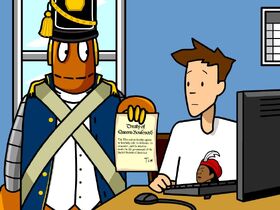 | |||
| Airdate | November 18, 2009 | ||
| Curriculum | Social Studies | ||
Tecumseh is a BrainPOP Social Studies video that aired November 18, 2009.
Summary[]
Appearances[]
Transcript and Quiz[]
- Tecumseh/Transcript
- Tecumseh/Quiz
FYI[]
Personalities[]
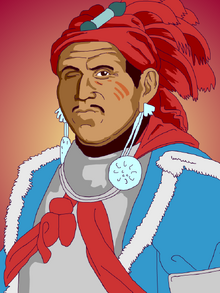
Tecumseh’s brother Lalawethika was the laughingstock of his community. Even his name—Shawnee for “noisemaker”—reflected his reputation as a foolish, drunken braggart.
Then, one day in 1805, he fell into a trance. When he came to, he claimed he’d met the Great Spirit and received specific instructions as to how his people should live.
He declared that all Indians should give up alcohol, along with the technologies that white Americans used, the food they made, and even the dogs and cats they bred. To reflect his new identity, Lalawethika changed his name toTenskwatawa, or “the Open Door.” Among whites, he became known as The Prophet.
European diseases had devastated the Indians of the Midwest, and many suspected witchcraft was involved. The Prophet took advantage, claiming that anyone who disobeyed or doubted his prophecies was actually a witch.
He soon proved he was serious. In 1806, Tenskwatawa was invited to Delaware and Wyandot villages and asked to identify suspected witches. He wound up participating in the torture and execution of four Indians.
The Prophet’s downfall came at the Battle of Tippecanoe. Tecumseh had left him in charge of their village, with specific instructions not to engage the U.S. Army. But after William Henry Harrison’s forces broke camp just a mile away, Tenskatawa urged the Indians to attack.
Foolishly, he told them they’d be protected by his supernatural powers, and that the soldiers’ bullets couldn’t hurt them. When the Indians lost the battle, their faith in the Prophet was destroyed, and most of them returned to their home villages. After the War of 1812, Tenskatawa drifted westward and died near what is now Kansas City in 1836.
Trivia[]
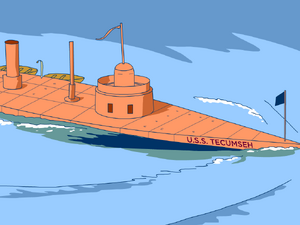
- During the War of 1812, Tecumseh helped the British capture Fort Meigs, near the modern city of Toledo, OH. After the siege, Tecumseh’s men started killing American prisoners while British commanders stood and watched. When he found out, Tecumseh immediately ordered the men to stop the violence—and then reprimanded a British general for allowing it to happen in the first place.
- In the Shawnee language, Tecumseh’s name meant either “Shooting Star” or “Crouching Panther.”
- William Tecumseh Sherman (1820-1891) was a famous Union general during the American Civil War. He received his middle name from his father, an admirer of the Shawnee warrior.
- Although their rivalry didn’t really get going until 1810, Tecumseh and William Henry Harrison first fought each other way back in 1794. At the Battle of Fallen Timbers, which took place near the modern city of Toledo, OH, Tecumseh was part of an Indian confederacy that was defending the Ohio Territory from the U.S. Government, while Harrison was a lieutenant in the army of General Anthony Wayne.
- Four U.S. Navy ships have been named after Tecumseh; the earliest one launched in 1863. There are also towns in five U.S. states—and one in the Canadian province of Ontario—named after him.
Quotables[]
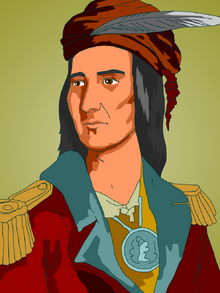
“You may give your hand in friendship to the French, or the Spaniards, or the British. But the Americans are not like those. The Americans come from the slime of the sea, with mud and weeds in their claws, and they are a kind of crayfish serpent whose claws grab in our earth and take it from us.” –Tenskwatawa, a.k.a. The Prophet, Shawnee religious leader. “Sell a country! Why not sell the air, the clouds, and the Great Sea, as well as the earth? Did not the Great Spirit make them all for the use of his children?” –Tecumseh, Shawnee warrior and statesman.
“[Tecumseh is] one of those uncommon geniuses which spring up occasionally to produce revolutions and overturn the established order of things. Were it not for the vicinity of the United States, he would, perhaps, be the founder of an empire that would rival the glory of Mexico or Peru.” –William Henry Harrison, American soldier and 9th U.S. President.
“Listen to the voice of duty, of honor, of nature and of your endangered country. Let us form one body, one heart, and defend to the last warrior our country, our homes, our liberty, and the graves of our fathers.” –Tecumseh.
“A more sagacious or a more gallant warrior does not I believe exist. [Tecumseh] was the admiration of everyone who conversed with him.” –Isaac Brock, British general.
Famous Faces[]
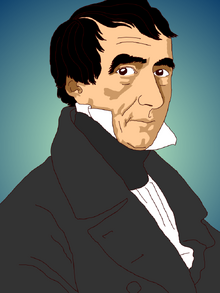
By the time he defeated Tecumseh at the Battle of the Thames, William Henry Harrison had already served as a U.S. Congressman and a territorial governor. So in 1816 the man nicknamed “Old Tippecanoe” went right back into politics.
Harrison represented Ohio in both the House of Representatives and the Senate and served as U.S. ambassador to Colombia. He retired to his Ohio farm 1829, but decided to run for President in 1836.
Running as a Whig (an early American political party), Harrison lost to Democrat Martin Van Buren that year. But four years later, Harrison ran again, becoming the first presidential candidate to openly campaign for himself.
The Whigs avoided discussing major issues, and instead focused on the candidates’ personalities. Democrats had tried to portray the 67-year-old Harrison as an elderly country bumpkin who loved nothing more than sitting on the porch of his log cabin and drinking hard (alcoholic) cider.
But the Whigs embraced the insult, and cabins and cider became prominent symbols of their campaign. They claimed that incumbent President “Martin Van Ruin” was a snooty, out-of-touch aristocrat, while Harrison represented good old-fashioned frontier values.
Whig rallies celebrated Harrison and his running mate, John Tyler, with street theater and sing-alongs. One campaign tune, “Tippecanoe and Tyler Too,” even became the most popular song in the nation.
Harrison won, but his campaign was more memorable than his presidency. He delivered the longest inaugural speech in American history, then caught pneumonia and died 31 days later. Although he was considered a hero in his own time, today he’s best remembered as the U.S. President who served the shortest term.

